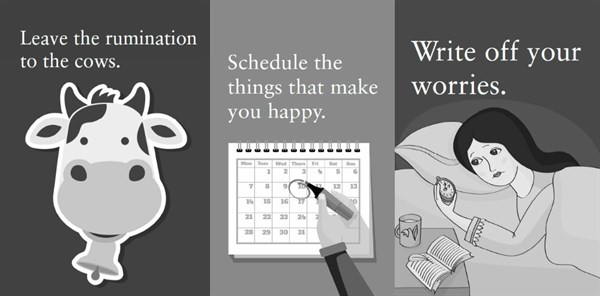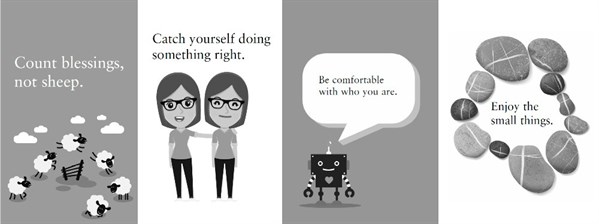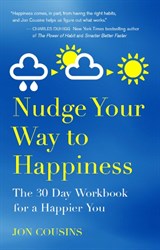Nudge your way to happiness
05 May 2016 | Jon Cousins
Founder of Moodnudges, Jon Cousins, shares how he
learned to 'nudge' his way towards greater happiness and how you
can too

I'm a bit ashamed to admit I'd been depressed on and off for
almost 30 years before I eventually decided to ask for help.
Although I never really got the support I'd hoped for from the
health system, I ended up OK. Let me tell you how.
In a nutshell, I found a way to manage my own well-being, and
the core concept boils down to two easy steps.
1. When your mood improves, it nearly always does so
gradually. No single overnight thing is likely to get you better.
Fortunately, however, it's easy to make steady progress if you take
small, simple actions every day.
2. If you understand your mood better, you can choose
actions that fit you well - neither too ambitious, nor too
unchallenging.
Now this might sound ridiculously simple, and in fact once you
know how to put it into practice, it really isn't complicated.
But it's taken me around 10 years to figure this out properly,
so if you'd like to get there a bit more quickly, please read
on.
Different on the inside
I've spent most of my career working for myself. Alongside
co-founders I've started several businesses. Some have done
well.
However, while probably looking successful, happy and
well-adjusted from the outside, all too often I was struggling with
depression on the inside.
For way too long I believed I could somehow manage without help,
and ironically it turned out that even when I did ask for it, I
ended up having to self-manage.
However one crucial plank in my recovery did come about through
seeing a psychiatrist, after being referred by my doctor.
She listened sympathetically enough, then asked me to return in
three months, to report back on how I'd been.
I don't know about you, but to me this seems a strange way to
handle someone who has clearly made a cry for help.
However, having been given what I regarded as a mission, I set
out to find a way to record my ups and downs that felt as objective
as possible, and I turned a tried-and-tested mood test into an
easy-to-use tool that would give me daily scores.
This turned out to be unexpectedly insightful.
Imagine dieting without weighing yourself
Imagine that instead of wanting to become less depressed, I'd
been trying to lose weight. Wouldn't it have made sense to weigh
myself regularly, so I'd see my progress?
Otherwise, how would I have known how I was doing?
Stepping on the bathroom scales would also have given me instant
feedback, showing me that getting some vigourous exercise had been
good for my weight - for example - while eating an enormous cream
cake definitely hadn't.
Tracking my mood gave me this kind of immediate feedback for my
emotional well-being, enabling me to discover actions that were
good for me, and others which weren't.
What did I discover?
In my case I learned, for example, that having unexpected
conversations about business finances were unhelpful mood-wise.
But being around other people gave me a lift, which came as
something as a surprise.
I'd always seen myself as self-contained, even a bit
introverted.
The trouble was, on my bleaker days, it was hard to contemplate
even leaving the house, let alone getting together with friends,
but this is when something really significant struck me.
Next stop, the Tearoom
Since my mood tracking was giving me a sense of how I was doing,
I could tailor my actions to fit this, so I decided to use the
Buttercross Tearoom in my local park as the basis of an ongoing
lunchtime experiment.
On the occasional day when I felt great, I would arrange to meet
a friend there.
On so-so days I'd go on my own, but exchange a word or two with
some of the other regulars.
And on particularly grim days, I'd still go, but would sit
quietly at a table on my own, still benefiting from being around
others, even if I didn't interact with them.
This worked, and my mood tracking proved it. So I steadily
introduced other kinds of daily actions, each time customising them
for my current mood.

Some of these were based on the Action for Happiness Ten Keys to Happier
Living, and I'm happy to say that I've got to know this
fantastic organisation and its Director, Mark Williamson, very well
over the years.
That's partly because I've already made some parts of my system
available to others.
At Moodscope.com, my co-founders and I gave many
thousands of people a way to track their mood.
Then, after moving on from Moodscope to start a new life in
California, I've blogged four times a week at Moodnudges.com, passing on ideas for
mood-lifting actions.
Combining the ingredients
Now, though, for the first time I've pulled together all the
pieces in the shape of a book that does the full monty.
Over a period of 30 days it enables you to measure and track
your overall well-being (emotional, physical and social) then each
day it directs you to one of three tailored actions, a bit like my
lunchtime tearoom experiments.
While writing the book I asked a small group to put my system to
the test, giving them simple actions designed to lift their mood
each day for a week, and also helping them understand their moods
by scoring them every day, enabling their actions to be
"made-to-measure".
This pilot test worked surprisingly well, and in fact two-thirds
of the trialists got better scores on a clinical depression test
after just seven days.
On your marks, get set, nudge
The full book, which takes the form of a 30 day
self-administered course is called "Nudge Your Way to Happiness"
and it's available now on Amazon in
the UK and internationally.
It took me 10 years to devise this system. I hope you'll make
rather faster progress.
And thank you, Action for Happiness, for being a huge force for
good in my own life and those of thousands upon thousands of
others.


Jon Cousins is the founder of Moodscope and Moodnudges and
has been an Action for Happiness supporter since the movement first
launched in 2011.